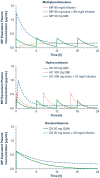Pharmacological principles guiding prolonged glucocorticoid treatment in ARDS
- PMID: 33150472
- PMCID: PMC7641258
- DOI: 10.1007/s00134-020-06289-8
Pharmacological principles guiding prolonged glucocorticoid treatment in ARDS
Abstract
Current literature addressing the pharmacological principles guiding glucocorticoid (GC) administration in ARDS is scant. This paucity of information may have led to the heterogeneity of treatment protocols and misinterpretation of available findings. GCs are agonist compounds that bind to the GC receptor (GR) producing a pharmacological response. Clinical efficacy depends on the magnitude and duration of exposure to GR. We updated the meta-analysis of randomized trials investigating GC treatment in ARDS, focusing on treatment protocols and response. We synthesized the current literature on the role of the GR in GC therapy including genomic and non-genomic effects, and integrated current clinical pharmacology knowledge of various GCs, including hydrocortisone, methylprednisolone and dexamethasone. This review addresses the role dosage, timing of initiation, mode of administration, duration, and tapering play in achieving optimal response to GC therapy in ARDS. Based on RCTs' findings, GC plasma concentration-time profiles, and pharmacodynamic studies, optimal results are most likely achievable with early intervention, an initial bolus dose to achieve close to maximal GRα saturation, followed by a continuous infusion to maintain high levels of response throughout the treatment period. In addition, patients receiving similar GC doses may experience substantial between-patient variability in plasma concentrations affecting clinical response. GC should be dose-adjusted and administered for a duration targeting clinical and laboratory improvement, followed by dose-tapering to achieve gradual recovery of the suppressed hypothalamic-pituitary-adrenal (HPA) axis. These findings have practical clinical relevance. Future RCTs should consider these pharmacological principles in the study design and interpretation of findings.
Keywords: Acute respiratory distress syndrome; Duration; Glucocorticoid; Glucocorticoid receptor; Pharmacodynamic; Randomized trial; Receptor affinity.
Conflict of interest statement
The authors declare no conflict of interest.
Figures





References
-
- Villar J, Ferrando C, Martinez D, Ambros A, Munoz T, Soler JA, Aguilar G, Alba F, Gonzalez-Higueras E, Conesa LA, Martin-Rodriguez C, Diaz-Dominguez FJ, Serna-Grande P, Rivas R, Ferreres J, Belda J, Capilla L, Tallet A, Anon JM, Fernandez RL, Gonzalez-Martin JM, dexamethasone in An Dexamethasone treatment for the acute respiratory distress syndrome: a multicentre, randomised controlled trial. Lancet Respir Med. 2020;8:267–276. doi: 10.1016/S2213-2600(19)30417-5. - DOI - PubMed
-
- Group WHOREAfC-TW, Sterne JAC, Murthy S, Diaz JV, Slutsky AS, Villar J, Angus DC, Annane D, Azevedo LCP, Berwanger O, Cavalcanti AB, Dequin PF, Du B, Emberson J, Fisher D, Giraudeau B, Gordon AC, Granholm A, Green C, Haynes R, Heming N, Higgins JPT, Horby P, Juni P, Landray MJ, Le Gouge A, Leclerc M, Lim WS, Machado FR, McArthur C, Meziani F, Moller MH, Perner A, Petersen MW, Savovic J, Tomazini B, Veiga VC, Webb S,Marshall JC, (2020) Association between administration of systemic corticosteroids and mortality among critically Ill patients with COVID-19: a meta-analysis. JAMA 324(13):1330–1341. 10.1001/jama.2020.17023 - PMC - PubMed
Publication types
MeSH terms
Substances
LinkOut - more resources
Full Text Sources
Medical
Miscellaneous

